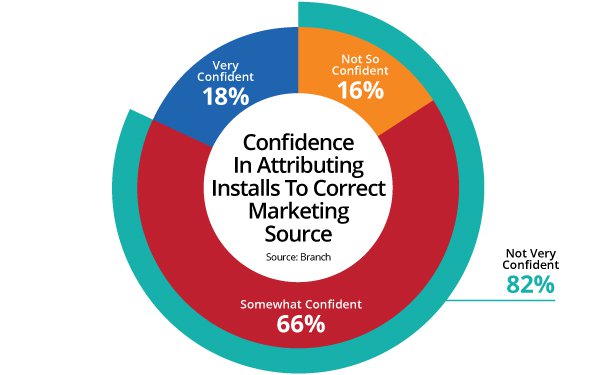
Marketers are challenged with putting
data insights together piecemeal to prove performance. Privacy changes and fragmented user journeys have blurred the picture of what truly drives growth. Companies expect artificial intelligence (AI)
to solve it all, but it doesn't.
“A major concern we hear is confidence, especially in attribution, retention strategies, and building sustainable, privacy-ready growth,” says
Paula Mantle, vice president of marketing at Branch.
We all know that companies doing a better job rely initially on first-party data, but then Mantle threw in the ability to unify
insights across channels with tools like deep linking and AI to acquire users and build relationships.
Take into consideration that Branch provides support for linking and measurement, but the
company released the State of App Growth survey report showing some interesting numbers.
advertisement
advertisement
For example, just 8% of companies surveyed have a full view of their app marketing performance across
multiple channels, and only 18% are very confident in their ability to accurately attribute app installs.
Companies have always been under pressure to do more with less, but with AI-based
technology it’s getting a little out of control. For example, when a friend applied for a job for his first week with the company, he interviewed with an AI chatbot that recommended a second
interview for the position.
New attribution models are expected to emerge in the coming months as pressure mounts to do more with less. In Branch’s survey, 36% of respondents cited
scaling without increasing costs as a major challenge.
Some 24% said difficulties converting ad clicks into installs ranked second, followed by 23% who cited targeting the right users through
paid campaigns. Seventeen percent of respondents also flagged attribution as a challenge, but highlighted it as major opportunity.
Only 18% of marketers are very confident in their attribution
data. Just 18% of marketers say they feel very confident in their ability to match app installs to the correct source, while 82% report only partial clarity, according to the data.
Attribution
and measurement strategies have been impacted by privacy changes based on SKAdNetwork, Apple's privacy framework for measuring the success of iOS ad campaigns; ATT, Apple's App Tracking
Transparency feature; and GDPR, the European Union law that sets strict rules for how organizations collect, use, and protect the personal data of individuals.
Some 41% of respondents reported
more challenges in cross-channel attribution, with 40% saying privacy changes have made contextual targeting more critical, and 40% reporting increased costs for data collection and analysis.
An overwhelming 74% of respondents say privacy regulations are creating costly measurement blind spots.
Data also points to user retention an issue for mobile marketers, who list their
three biggest retention challenges as difficulty in activating user data for personalization, 47%; tracking and measuring retention success, 47%; and lack of visibility into user behavior
post-acquisition, 43%.
The average app marketer now uses 3.8 channel categories to drive growth. Thirty-nine percent of respondents report using four channels, while 27% use
five. Multichannel strategies are no longer are an experiment. Retail leads with an average of 4.0 channels. Between one to two incremental purchases often tied to each new app user.
Healthcare teams average 3.4 channels. The focus here is often on engagement and utility rather than acquisition.
Apps are more likely to support appointment scheduling, access to results,
or check-in processes, which means fewer high-intent entry points and a different approach to lifecycle marketing, according to the study.
More channels bring opportunity, but also complexity.
The study states that without a strong infrastructure for linking and attribution, understanding what is working becomes harder as the mix expands.
Branch surveyed 750 full-time employees at
companies with more than 500 employees across the United States, the U.K., EMEA, APAC, and Australia in May 2025, where mobile apps represent a significant part of the business.
The survey was
conducted in collaboration with Global Surveyz, an independent survey company. Employees were required to hold director-level roles or higher in growth, marketing, or product departments, and
needed to be directly involved in mobile initiatives.